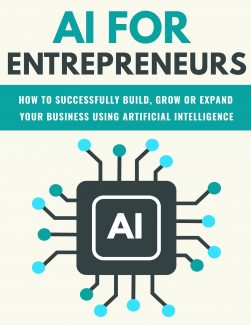 License Type: Private Label Rights
License Type: Private Label Rights  File Type: ZIP
File Type: ZIP
 SKU: 63972
SKU: 63972  Shipping: Online Download
Shipping: Online Download
Sample Content Preview
Introduction
The technology industry has fallen in love with artificial intelligence, also known as AI. With applications that range from automated customer service to high-end data services, artificial intelligence is popping up all over the place.
Rob Marvin and Brian Horowitz from PC Magazine point out that AI is clearly a growing force in the industry, taking center-stage at conventions and conferences and showing a lot of potential for a wide variety of industries (including manufacturing and retail).
New products are already equipped with virtual assistants and chatbots are answering your customers’ questions for you. And companies like Google and Microsoft are “integrating AI as an intelligence layer across their entire tech stack.”
This isn’t the artificial intelligence that science fiction has conditioned us to expect, though. While there are a few robotic androids, there’s no Skynet. We don’t even have Jarvis, the AI butler from the Iron Man movies. What we do have is smarter tech and far more powerful data.
And what that means is that, according to the CEO of Sas.com, “Widespread advancement in machine learning (ML), computer vision, deep learning, and natural language processing (NLP) have made it easier than ever to bake an algorithm layer into your software or cloud platform.”
For your business, practical AI applications can take almost any form, depending on your organizational needs and “the business intelligence (BI) insights derived from the data you collect.”
You can use AI for everything from “mining” social data, automating customer growth and data collection, to driving customer engagement to optimizing logistics and overall efficiency.
In this special report, we’ll take a close look at how you can use AI in your business successfully.
Let’s begin!
What AI Can Do for You
A survey of CEOs from small- to medium-sized businesses (conducted by Vistage, an executive coaching company) found that artificial intelligence is quickly becoming an important part of business processes.
In that survey, 29.5% of business leaders said that AI, of all new technologies, would have the greatest impact on their business in the next year.
In the finance industry, some of the lenders have already started using AI or machine learning to improve the risk assessment process.
But you don’t have to look toward the future to see what artificial intelligence can do for you now. AI-based tools can offer you several benefits, including:
Lowering costs
Reducing risk
Reducing time spent on tasks
Increasing results
Improving flexibility and responsiveness
Here are four specific areas where artificial intelligence can help you grow and manage your business:
Improving sales and marketing—Customer relationship management (CRM) systems are designed to collect customer information from communication channels like phone, email, and social media.
The goal is to help improve and even automate the sales process.
Platforms like Salesforce have begun using AI that helps small businesses analyze the data from those communication channels and then adjust lead generation activities and marketing based on that information.
AI-infused CRMs can help you generate more leads for the same amount of marketing money. They also show how AI can be used to gather marketing- and sales-relevant insights to optimize nearly the entire customer acquisition process.
Automating customer communication. Many small businesses have started using chatbots on their websites.
Chatbots can initiate conversations and help answer customer questions. It’s like a 24/7 sales or customer service rep.
You’ve probably already encountered a chatbot, even if you didn’t think of it as artificial intelligence. It’s that little pop-up chat box at the corner of a website that asks if you have any questions or problems.
If you don’t have a dedicated customer service or sales team yet, a chatbot might be the way to go, taking some of the pressure off your shoulders and letting you put your focus on the things that are important.
Streamlining human resources tasks—An unexpected area where AI has started appearing is in the field of human resources.
AI tools are available to not only streamline the hiring and “onboarding” processes, but also gather information from new employees that helps HR improve those processes. And both of these can have a major impact on your bottom line.
AI can automatically sort through that stack of applicants to find the people who most closely match the criteria you’re looking for.
This can not only improve your odds on finding the perfect candidate, but also save you valuable time and resources.
And once that candidate is brought onboard, the software can help educate employees with questions about company benefits or policies.
This can reduce the time you spend on the hiring process and increase the number of high-quality candidates you see, since you just don’t have the time to wade through all those applications yourself.
It then reduces the amount of time HR spends on answering questions from your new employees.
Acquiring competitive intelligence—You’ve probably dreamed of being able to gather and analyze your competition easily—from written and video content to social media posts and marketing campaigns that help them better position their business.
Well, the great news is that artificial intelligence can do that for you!
There are several tools that let you keep tabs on your competitors and their activities, including collecting the information for you, and then convert it into easy-to-read reports.
Crayon, for example, a competitor analysis tool, uses artificial intelligence to track competitors across a variety of digital channels such as their websites or social media posts.
It then collects a variety of information for you, like slight adjustments in their marketing language or pricing changes.
These types of AI tools allow you to gather more detailed information faster, which means you respond faster and more efficiently to industry changes that might affect your business!
- License: Private Label Rights
- Category:Ebooks
- Tags:2021 Ebooks Private Label Rights








